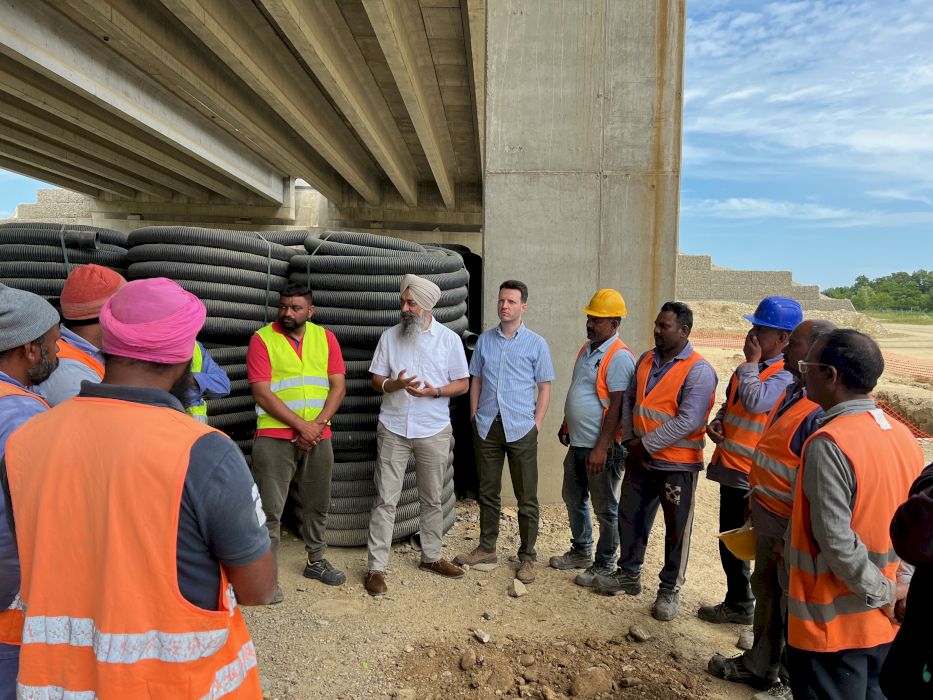The current context of Asian labor in the construction industry

The construction industry in Romania is undergoing a remarkable transformation thanks to the integration of Asian workers, which not only reduces labor shortages but also enhances the quality and efficiency of projects.
The contribution of these workers is being felt by alleviating the shortage of skilled labour. With superior skills and extensive experience gained in developed markets, they bring tangible improvements in construction quality. The result is increased productivity and improved safety on construction sites.
An additional benefit is the introduction of innovative working techniques and the adoption of cutting-edge technologies. This paradigm shift not only boosts innovation in the sector, but also facilitates adaptation to international standards, which are essential for the continuous modernization of the industry.
In addition to these technical and professional advantages, these foreign recruitment services contribute to the cultural diversification of the workforce. This cultural diversity fosters a dynamic working environment, stimulating innovation and improving interpersonal relations through the exchange of perspectives and working methods.
The process of recruiting non EU construction workers has a beneficial economic impact by increasing the efficiency and quality of projects, attracting more foreign investment and supporting Romania’s economic expansion. These elements compose a framework in which the construction industry can develop sustainably, adapting to global market requirements.
What is the state of the construction labor market?
The Romanian construction labor market is facing multiple challenges in the current post-pandemic context and geopolitical tensions. The labor shortage has become a worrying reality for many contractors in this sector, who are forced to look for innovative solutions to complete their projects on time.
One of the most pressing problems is the continuing migration of the workforce. Due to the limited flexibility options in construction jobs, which require physical presence and adherence to a rigorous schedule, many workers are choosing to move to areas that offer more flexible working conditions or more attractive salaries.
This trend is amplified by changes brought about by the COVID-19 pandemic, which has popularized the concept of working from home and increased employee expectations of job flexibility.
Construction contractors need to find creative ways to attract and retain talent, such as offering competitive salary packages, opportunities for advancement and continuing education. It is essential to explore new technologies to streamline work processes and reduce reliance on physical labor, thus adapting to new market realities.
Helping the construction worker recruitment process
Thanks to their internationally recognized level of dedication and reliability, these foreign workers bring significant added value. Coming from lower wage countries, their financial expectations are moderate, which gives them a competitive advantage in the labor market. The most popular trades in construction sector are shuttering carpenters, steel fixers, masons, painters, dry wall workers, machine operators, welders, pipe fitters, electricians and others.
This situation offers construction managers the opportunity to improve team performance and ensure a steady stream of professional development for the entire workforce. Integrating skilled Asian workers can help optimize processes and increase the productivity of the construction projects.
Benefits of employing Asian workers in Romania
Many companies in Romania are discovering the benefits of employing foreign workers, a practice that is becoming more and more widespread in various sectors. The process of recruiting construction labor can bring significant benefits, as we will detail below.
- Optimized costs
The process of recruiting Asian construction workers can be a cost-effective option for local businesses. Even if initial investments are needed for transportation and accommodation, in the long term, costs can be significantly reduced.
Asian construction personnel appreciate the opportunity to work in Romania, an EU country, which is why they are often highly motivated and dedicated to their tasks, thus contributing to increased productivity.
- Loyalty and dedication
Another major advantage of working with Asian employees is their loyalty to their employer. Given the significantly improved living conditions they can find in Romania, they are often grateful for the opportunity and strive to exceed expectations. This can significantly reduce staff turnover, ensuring greater stability within teams.
- Efficiency and adaptability
Asian workers are known for their ability to learn quickly and adapt effectively to new working environments. Even the unskilled can provide quality service by quickly learning the necessary techniques and procedures. This can speed up projects and improve company workflows.
Hiring Asian staff in Romania not only helps to optimize costs and increase efficiency, but can also bring cultural diversity, contributing to a more dynamic and innovative working environment. This is a strategy that managers in different industries should consider, given the multiple benefits it can bring.
Legislation on hiring Asian workers in Romania
The solution to labor shortages can often be found through international recruitment, especially from Asia, a region that has become increasingly attractive to Romanian employers. This approach not only opens up new opportunities for entrepreneurs, but also helps diversify and enrich the local workforce.
In order to ensure an efficient and legally compliant hiring process, there are several essential steps that employers need to follow. First of all, obtaining the Work Permit is very important, as it is the first official step for a non-EU national to get employed.
The next step involves obtaining a long-stay visa, which is required to allow the prospective employee to enter and reside in Romania for the duration of employment. It is also necessary to obtain the right of residence by issuing a Residence Card (TRC) in Romania, which legalizes the individual’s employment status in the country.
These steps not only ensure compliance with the laws in force, but also facilitate the smooth integration of newcomers into Romanian society and the Romanian labor market. In the context of a labor shortage, adopting a construction worker recruitment strategy can be a smart move for any business, providing a viable and long-term solution to growth and expansion needs.
